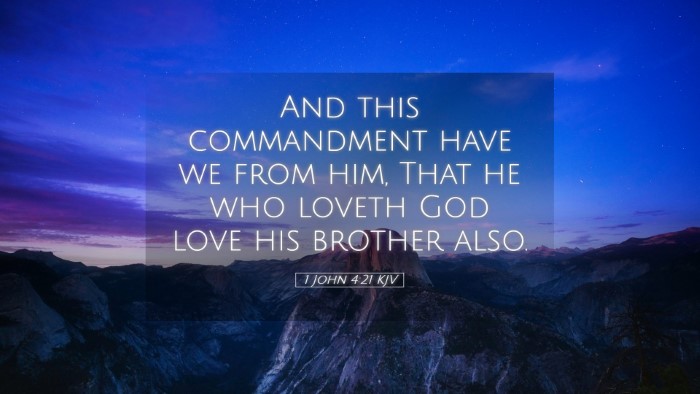Old Testament
Genesis Exodus Leviticus Numbers Deuteronomy Joshua Judges Ruth 1 Samuel 2 Samuel 1 Kings 2 Kings 1 Chronicles 2 Chronicles Ezra Nehemiah Esther Job Psalms Proverbs Ecclesiastes Song of Solomon Isaiah Jeremiah Lamentations Ezekiel Daniel Hosea Joel Amos Obadiah Jonah Micah Nahum Habakkuk Zephaniah Haggai Zechariah Malachi1 John 4:21
1 John 4:21 KJV
And this commandment have we from him, That he who loveth God love his brother also.
1 John 4:21 Bible Commentary
Commentary on 1 John 4:21
Verse: "And this commandment have we from him, That he who loveth God love his brother also."
Introduction
The Apostle John encapsulates the essence of Christian conduct in 1 John 4:21, pouring forth a profound principle that intertwines love for God with love for our fellow believers. The interconnectedness of these two forms of love is crucial for understanding the Christian faith and community. This commentary draws from esteemed public domain sources including Matthew Henry, Albert Barnes, and Adam Clarke, aiming to elucidate the depth of this verse for pastors, students, theologians, and Bible scholars.
Exegesis of 1 John 4:21
Matthew Henry’s Insights: Matthew Henry asserts that the commandment referred to here emphasizes that love is both a duty and a fruit of obedience. He notes that a genuine love for God will manifest itself in love for our brethren, acting as tangible proof of our relationship with the Divine. Henry articulates that the nature of God as love (1 John 4:8) compels believers to exhibit this same love towards one another, establishing a divine cycle of love within the Christian community.
Albert Barnes’ Commentary: Albert Barnes expands upon the moral imperative found in this verse. He highlights that the commandment is given directly from Christ, illustrating the significance of divine instruction in ethical living. Barnes emphasizes that our love for God cannot exist in isolation from our interactions with others; to love God is to love what He loves, particularly His people. He suggests that this interrelation of love is crucial for true fellowship among believers, reinforcing that the practice of love is a hallmark of genuine faith.
Adam Clarke’s Analysis: Adam Clarke focuses on the nature of the commandment. He suggests that it is not merely a suggestion but a divine mandate, underscoring the gravity of the instruction. Clarke elaborates that love for God and love for our brothers and sisters are not separate entities but rather two sides of the same coin. He posits that failing to love one another is equivalent to failing to love God, an assertion that carries serious ramifications for the believer. Clarke’s commentary encourages those reading to reflect on their relationships with fellow Christians as a measure of their devotion to God.
Theological Implications
- The Nature of God: God’s nature as love implies that love must be the defining characteristic of all who are created in His image. The passage reinforces God's call to imitate His attributes, thus encouraging self-examination regarding one’s ability to love.
- The Command of Love: The commandment to love is not an optional facet of Christian life but a foundational decree that transcends individual preference and reflects divine order.
- The Illustrative Power of Christian Community: The visible community of believers is to reflect the love of God. This communal aspect reinforces the teaching that the church is not merely a gathering but an extension of Christ’s love through its members.
Practical Applications
The practical implications of 1 John 4:21 are manifold for contemporary Christians:
- Engagement in Community: Believers are called to actively engage in the lives of their fellow Christians, fostering an environment of support, encouragement, and love. This might involve community service, prayer groups, or simply offering kindness and understanding.
- Reflecting God’s Love: Every interaction with others should reflect an understanding of God’s love. This means embodying patience, forgiveness, and compassion, as these qualities resonate with the love that God has shown towards us.
- Accountability: As part of the body of Christ, believers ought to hold one another accountable to the call of love. This nurtures spiritual growth and reinforces the command given by John, effectively creating a loving and respectful community.
Conclusion
1 John 4:21 serves as a powerful reminder of the interconnected nature of our love for God and our love for others. Commentaries by Matthew Henry, Albert Barnes, and Adam Clarke not only enrich our understanding of this verse but also challenge us to live out this truth in our daily lives. For pastors, theologians, and students, meditating on this commandment offers a roadmap for practical Christian living. The call to love is both a privilege and a responsibility that transforms individual believers and the church at large, paving the way for a community that genuinely reflects the heart of Christ.
Further Reflections
In closing, let us bear in mind that in all we do, love should guide our actions and motivations. This commandment invites us to look closely at our relationship with God and our relationships with one another, urging us to align them with the love exemplified in Christ’s life. As we delve deeper into this essential element of our faith, may we grow in our ability to love and thereby fulfill the command we have received.


